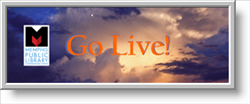A Case for a Wiki
The slew of e-mails today regarding Section 8 applications got me thinking. Would it not be easier for all of us to keep track of something like this via the MPLICWiki rather than email? If you are helping a customer now, and they are wondering where they can pick up an application, you have to scan your Inbox to see what the latest word is for a specific branch (do they or do they not have applications available).
The wiki version would have a page that lists all of the branches with a note indicating whether or not they have section 8 applications...or if their air conditioner is broken...or if their typewriter is broken...or whatever special news that branch may have.
Whenever the status changes (the branch runs out of applications; the branch received a new batch of applications; the typewriter now works, etc.), someone from that branch could edit the page to notate that change (instead of sending or in addition to sending the email). The entire system would have immediate, quick access to all the special notes for all locations.
However, MPLIC is not quite ready for this yet. Currently, just about all staff are trained on the use of email. If a message needs to be sent to the system, just about anyone can do that now via email. As easy as editing a wiki can be, if we do not have the staff to make the immediate changes when necessary, then your product loses validity fairly quickly.
One of the trainings I will offer in the fall is a Wiki Editing training. This will hopefully be the first step towards building a comfort level with the MPLICWiki so that we may utilize it more in the future.





